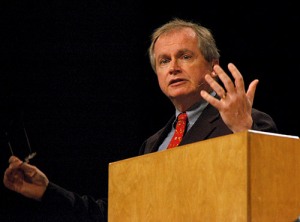Friends You Should Meet (7) — D. A. Carson


It’s no secret that I love books. Here in my study I often feel like I’m surrounded by good friends. In this series of posts, I’d like to introduce you to some of my friends, both the old ones from centuries ago and the more recent ones. I’ll describe their strengths and, where necessary, their weaknesses. The aim is to help you find good friends for yourself — in other words, to find edifying reading that will give you a better understanding of the Christian faith, a greater grasp of the gospel, and a deeper love for Christ.
Donald Carson is the only Canadian-born friend we’re going to meet in this series. He’s also the only author that I’m currently reading. In front of me I have his Collected Writings on Scripture. I hope to have a review of that posted here shortly.
Carson was born in 1946 in Montreal, I believe. His father was a Baptist pastor and missionary, first among English-speaking Quebeckers, then among the French. For Don Carson, one of the results is bilingual fluency. He did his undergrad studies at McGill University in Montreal, and then obtained a Master of Divinity degree from Central Baptist Seminary in Toronto. Carson was ordained in 1972 at a Baptist church in Richmond, BC. He then went on to obtain a Ph.D. in New Testament studies at Cambridge. After some years as a professor at a Baptist seminary in Vancouver, he moved to Wheaton, Illinois, to take up a position teaching New Testament at Trinity Evangelical Divinity School. He’s still there today. He’s written numerous books and articles. He frequently speaks at conferences and is actively involved with the Gospel Coalition.
Why is D. A. Carson important? Carson has three endearing qualities. First, he is a New Testament scholar with a high view of the Bible. He believes fervently in biblical inspiration and inerrancy. Unfortunately, there are not many high-level NT scholars with such views of their subject matter. Second, Don Carson loves the gospel. This is reflected in his work with the Gospel Coalition and Together for the Gospel. His passion for the good news also surfaces in just about everything he writes. Third, Carson, like Mike Horton, is able to produce both high-quality scholarly writing and popular works that will edify any Christian.
Where do I start? If you’re looking for something to whet your appetite, the best place to start is Carson’s biography of his dad, Memoirs of an Ordinary Pastor. You can download it for free here. Then ease into Carson’s biblical scholarship with his helpful little volume, The Difficult Doctrine of the Love of God. If it’s devotional reading that you’re looking for, check out his Scandalous: The Cross and Resurrection of Jesus. You can find my review here. If you’re a seminary student, or if you’re a pastor and haven’t read it yet, Exegetical Fallacies is a must-read. If you have an interest in postmodernism and hermeneutics, The Gagging of God is a thorough treatment. Finally, if you’re looking for a more complete author profile, Andreas Köstenberger has something helpful.
What to look out for? Well, if you haven’t guessed it already, Carson is a Baptist. I don’t view the denial of infant baptism as a minor, insignificant matter. However, honestly I don’t recall reading anything from Carson that has ever lept out at me as being distinctly Baptist. It’s not as if he makes a point of arguing for believers’ baptism in each of his books, or even laying the foundation for that position. I think his purposes are higher. Another point worth mentioning is that Carson is not a cessationist — he believes that charismatic gifts did not cease with the time of the apostles. But again, this is not a strong theme tainting his writings. With regards to the doctrine of salvation (soteriology), Carson is Calvinistic. He holds to the doctrines of grace. Moreover, he frequently refers to the importance of confessional Christianity. He doesn’t mean that as a reference necessarily to the Three Forms of Unity or Westminster Standards, but to the kind of Christianity that grounds itself in confessions generally oriented to the Protestant Reformation. Though I don’t care for the expression myself, some would call him a “Reformed Baptist.”
I heard Don Carson speak earlier this year at the Canadian Gospel Coalition Conference just a few streets over from us here in Hamilton. I was impressed. He writes well, but speaks even better. Pretty much anything that Carson writes, I’ll read. If he’s speaking nearby, I’ll be there. I guarantee that this friend will edify you as well.


